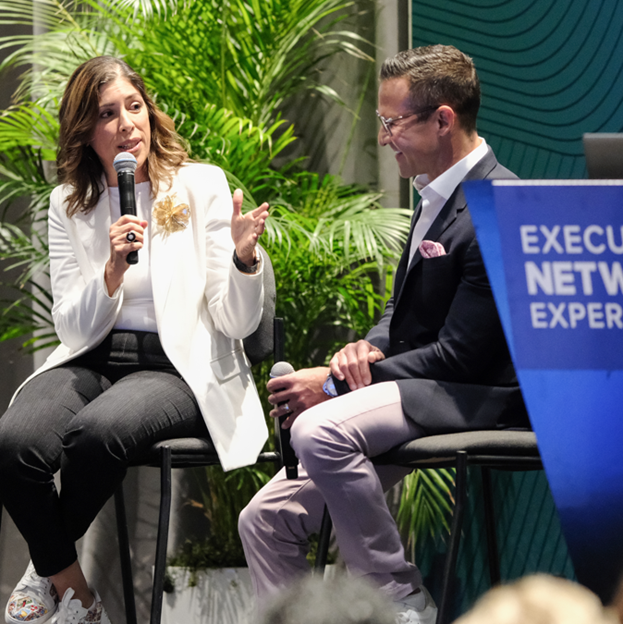Even after a decade in senior leadership roles, Melissa Werneck wasn’t sold on the benefits of—or the need for—an executive coach.
“Until 2019, I actually didn’t believe in coaching,” said Werneck, global chief people officer at the Kraft Heinz Company, during this summer’s SHRM24 Executive Network Experience (ENX) in Chicago. However, when a colleague raved about the benefits of coaching and encouraged Werneck to try it out, she finally did.

Melissa Werneck and Carlos Abrams-Rivera of Kraft Heinz
“It totally transformed me, and I learned how to also coach others by learning how to accept being coached,” she said. “It’s important to bring people from outside your organization to keep you grounded and to keep the reference of what greatness looks like. … It made us so much better. It’s an internal partnership, but it’s also someone with fresh eyes.”
Carlos Abrams-Rivera, the CEO of Kraft Heinz, also went through his own coaching journey—and the process wasn’t always fun.
“You have to understand that you’re going to be dealing with some things you’re uncomfortable with. Nobody wants to be sat down and told, ‘You have to work on this and this and this,’ ” said Abrams-Rivera. “Yet the more uncomfortable you are, the greater chance you have to grow. In my own career, the moments I’ve been most uncomfortable are the places I’ve seen the biggest amount of growth. … When you go into those moments, be open, be vulnerable, and be willing to take that feedback so you can become better.”
Other business leaders at this year’s ENX identified the benefits of coaching on their careers. Here are some lessons they’ve learned along the way:
1. Set Goals—Don’t Coach for the Sake of Coaching
Tamla Oates-Forney, CEO of Linkage, a SHRM company focused on women in leadership, said some executives shy away from coaching because they see it as admitting to failures in their leadership style.
“Not everybody wants to be coached because they think coaching is for those that are weak,” said Oates-Forney. But as we saw in the Olympics, “even the best athletes have coaches.”
Oates-Forney said that whether you’re getting executive coaching yourself or setting coaching up for your leadership team, it’s important to establish goals before you jump into this commitment.
“Determine why you are coaching. What are you coaching for or against?” she said. “You don’t coach people just for the sake of coaching—you need to have a reason. So you have to identify the development opportunities and have an assessment to determine what closing the gap through coaching and other interventions look like. … Clarity around that ‘why’ is critically important to determine whether the coaching is going to be impactful.”
2. Don’t Keep Your Coaching a Secret
By sharing your own coaching journey with others in your organization, you’ll encourage leaders and staff to be open to their own coaching.
After Annette Wooters, CEO of the Far West Division of HealthTrust Supply Chain, found success with an executive coaching experience, she had the members of her executive team go through the same process.
“They loved the coaching, and it helped that I was incredibly transparent with my team about my own coaching,” said Wooters. “I shared with them what my weaknesses are, what my growth areas are, and what I learned from my coach. … I highly advocate for coaching because it is transformative.”
3. View Coaching as a Step Toward Self-Care
The bottom line of accepting coaching is that you can only improve your management and leadership skills by taking an in-depth look at yourself first. That’s why, for HR leaders, executive coaching can be the ultimate version of self-care.
“It’s important to put your own oxygen mask on first—for you and your teams,” said Tracy Layney, CHRO of Levi Strauss & Co. “Take care of yourself and you’ll be able to model that for the whole organization.”
Was this resource helpful?




